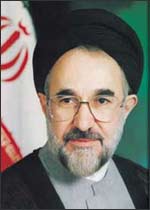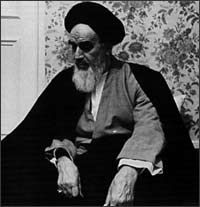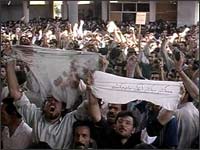Struggle for the Direction of a Nation
 |
| Iranian President Mohammad Khatami |
Like the United States, Revolutionary Iran has three branches
of government: The Legislative, Judiciary, and the Executive.
The Clerics control the judiciary and the executive, in the
form of President Mohammed Khatami. Although he is a mullah,
the president is an enormously popular figure, reelected in
2000 by an overwhelming majority.
Reformers consider him among their ranks, but political philosopher
Youssuf Alijabadeh says Iran's President doesn't represent one
side or the other. He says that the Iranian president himself
wavers between "modernity and despotism." "He
is a cleric and a modernizer. He embodies in his personality
a tension between modernization and organized religion,"
says Alijabadeh.
Over and above the three branches of government sits the council
of guardians, clerics presided over by the Supreme Leader, Ayatollah
Khameini. He has the final say on foreign policy, judicial decisions,
and is allowed to overturn legislation deemed to be anti-Islamic.
Twenty-two years after the revolution, Iranian society is balanced
on the relationship of the reform-minded Khatami and the conservative
Khameini.
Islamic and Revolutionary
 |
| Ayatullah Khomeini |
Westerners trying to understand the hold of Ayatollah Khomeini's
Revolution in Iran often focus exclusively on Islam. This is
a mistake in the view of longtime Tehran resident, Cathy Squire.
"They forget the Revolution part," says Squire. "As
far as women are concerned, I think that it has opened up women's
aspirations, and has created a lot of opportunities that weren't
there before," she says.
Squire, who works with local Iranian non-governmental organizations,
doesn't deny that women face problems of equality in the country.
Islamic Sharia law pretty much guarantees that in terms of marriage,
divorce, and inheritance women are discriminated against. However,
she says the situation is more complicated than people in the
West understand.
Squire points to literacy rates as an example of revolutionary
changes in Iranian society. She says rural literacy rates for
women have risen almost 85 percent. "That was a deliberate
government policy, to go out and make sure that as many people
as possible could be literate."
There are limits, though, to the Islamic revolutionary government's
ability to deal with the modern world. Working on contemporary
social problems increasingly is the realm of local nongovernmental
organizations.
Drug Abuse in the Islamic Republic
In the holy city of Mashad, 80 miles from the Afghanistan border,
stands the shrine of Imam Reza, the only one of Mohammed's direct
descendants to be buried in Iran. It is Iran's Lourdes, a place
of pilgrimage. Sooner or later all Iranians come here.
Hundreds press through massive doors covered in pure gold to
get close to the Imam's sarcophagus while thousands pray outside
waiting their turn. Murmured prayers fill the shrine.
In the corridors, groups periodically gather to sing about
the martyrdom of Hossein, the great saint of Iran's Shia Muslims.
Adjacent to the Shrine is Mashad's bazaar. The atmosphere there
is considerably less sacred. In the shrine's shadow, drug addicts
are waiting to score opium, heroin, or hashish.
 |
| Pro-democracy demonstrators rally in
Tehran, 1999 |
According to psychiatrist Hamid Salehpour, director of the
Sun Group, a local nongovernmental organization director, 1.5
million Iranians are drug addicts, around 3 percent of the population.
In a country ruled by Islamic law, that is a shocking figure.
Alcohol and all stimulants that alter consciousness are strictly
forbidden by the Koran.
The spiritual essence of Revolutionary Islam is puritan. The
nature of Iranian society is sensual.
Three decades into the reign of the Mullahs, the need to express
this sensuality is gnawing away at their control. Sometimes
it shows itself through the sheer joy of dancing in the streets,
sometimes negatively, taking heroin in the shadow of a Holy
Shrine.
Continued: Appeal of Fundamentalism
Growing in Egypt



